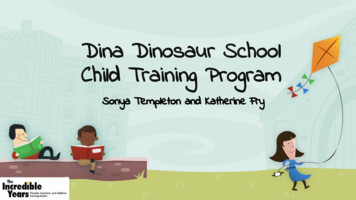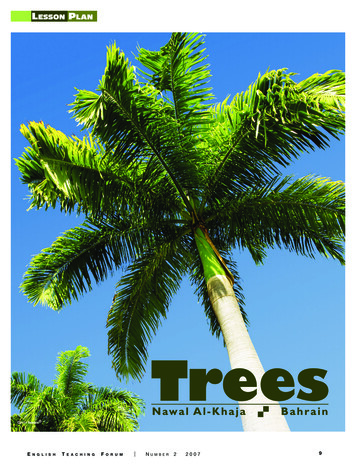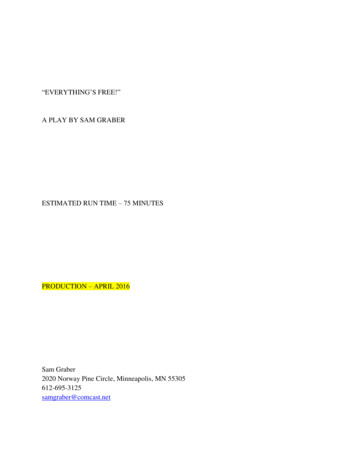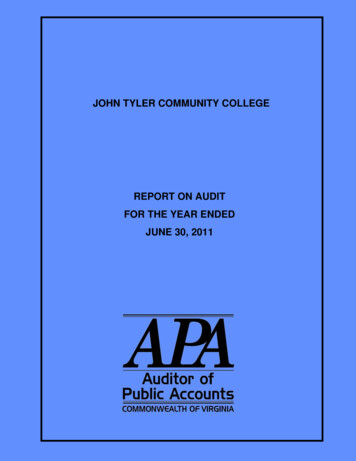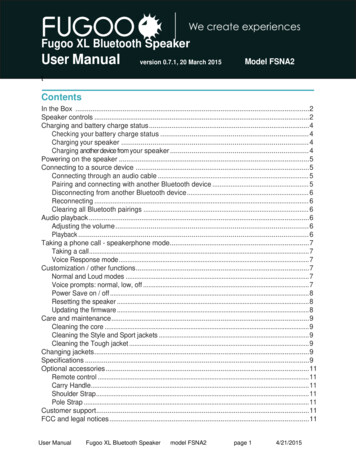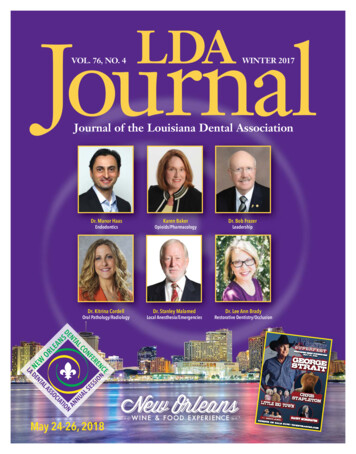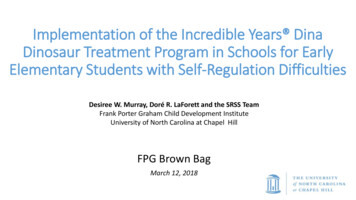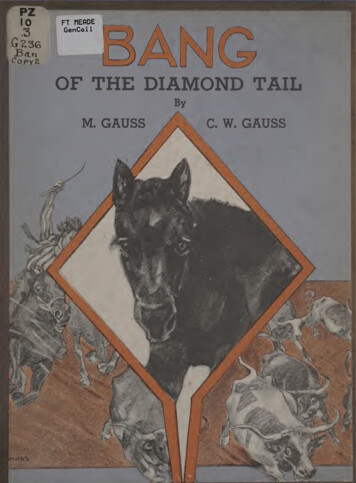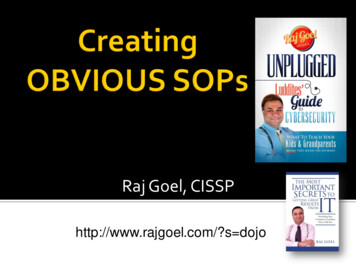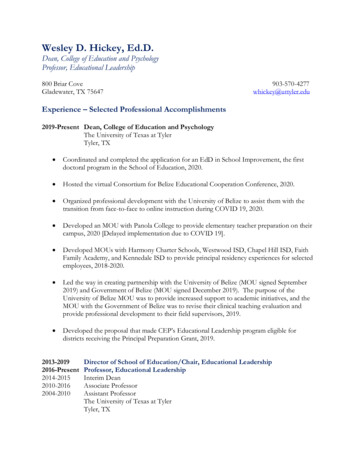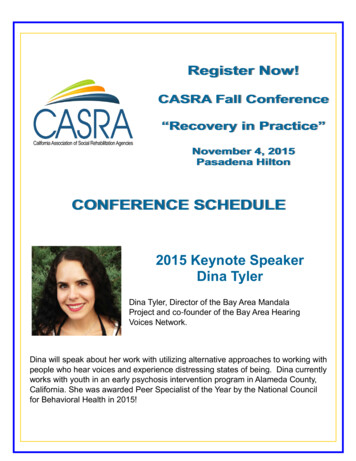
Transcription
2015 Keynote SpeakerDina TylerDina Tyler, Director of the Bay Area MandalaProject and co-founder of the Bay Area HearingVoices Network.Dina will speak about her work with utilizing alternative approaches to working withpeople who hear voices and experience distressing states of being. Dina currentlyworks with youth in an early psychosis intervention program in Alameda County,California. She was awarded Peer Specialist of the Year by the National Councilfor Behavioral Health in 2015!
Wednesday, November 4, 20158:00- 9:00Check-in and Late Registration9:00-10:30Welcome and Keynote Presentation10:45-12:15Session I Workshops12:15-1:15Lunch1:15- 2:45Session II Workshops3:00- 4:30Session III WorkshopsSCHEDULE OF WORKSHOPSSession I10:45-12:15Workshop #1Working with Psychosis: Introduc on to the Hearing Voices Movement and Meaning-Centered Alterna vesNev Jones, Ph.D.Psychosis remains one of the most widely misunderstood and mischaracterized experiences. Drawing on thepresenter’s lived experience, research and involvement in the development of community-based peergroups, this workshop will introduce par"cipants to the hearing voices movement and allied “meaningcentered” approaches to voices and unusual beliefs.Workshop #2Crisis Response and Peer SupportAngela Abbo&, Senior Peer Support Communica"ons Specialist and Shannon McCleerey-Hooper,Peer Policy & Planning Specialist, Riverside County Department of Mental Health, Consumer AffairsPar"cipants will hear about a highly successful peer-run program that has reduced unnecessaryinvoluntary holds in Riverside County, resul"ng in cost savings. The workshop will iden"fy thestrategies that allow individuals to maintain some control over the process of their recovery.Workshop #3Beyond Pills: Evidence-Based Prac ces for Depression RecoveryVince Caimano, Ph.D., Founder and CEO of Support Groups CentralThe latest research on depression tells us that there is no one cause. Effec"ve treatment therefore involvesseveral different techniques. Join Dr. Vince Caimano in this informa"ve and helpful session where he willdemonstrate techniques that you can immediately use.2
Workshop #4Quality of Life ProgramMark Schumacher, Cer"fied Peer Specialist and Kalie Ma"sek, MFTi, Turning Point Founda"onPeople living in board and care homes are typically marginalized, have limited resources for socialengagement and are o7en very lonely. Hear how to bring socializa"on and engagement services to residentsdirectly, including groups, ac"vi"es and ou"ngs that create connec"ons and relatedness to others.Workshop #5Implementa on of Military Family Programs in Community Mental Health: The Importance ofCollabora onSara Mehrabani, Psy.D. and Erica Trejo, LMFT, Didi Hirsch Mental Health ServicesWe will be discussing the strengths and challenges with implemen"ng a military family program in acommunity mental health se;ng. Issues involving s"gma, outreach, and access will be discussed as itpertains to engaging military- connected youth and families.Session II1:15- 2:45Workshop #6Psychosis Sucks! Working with People in Severe DistressWayne Munchel, LCSW, Director of TAY Services, STARS Behavioral Health GroupThis presenta"on will provide an overview of current understandings and approaches to peopleexperiencing psychosis. Par"cipants will learn several prac"cal strategies about how to effec"vely engage,normalize and enhance coping skills. Resources and tool-kits will also be made available.Workshop #7Culture in RecoveryChris"an Maldonado, MSW, Trainer and Field Support Specialist, Mental Health America Los AngelesThe training is intended to focus on the concept of culture and the role it plays within the recovery paradigmof mental health. The influence that culture has in the development of therapeu"c rela"onships, withpar"cular a&en"on to the direc"on of treatment planning and the course of recovery. Principles ofmul"cultural psychiatric rehabilita"on and cultural sensi"vity will also be explored.Workshop #8Doing the Hard Work of Recovery: Building a Bridge From a River of Suffering to Inclusion in ourCommuni es (Part 1 of a 2-part series)Mark Ragins, MD, Mental Health America Los AngelesDelve into the three stages of recovery with Dr. Ragins. Explore how we can 1) connect with people and helpto pull them out of the river, 2) help people to shake themselves off, heal wounds, learn to walk again, and3) help people make their return to the web of rela"onships in their community, having roles and belonging.3
Workshop #9An Introduc on to the Honest, Open, Proud ProgramMalia Fontecchio, Program Coordinator, Project Return Peer Support NetworkThe Honest, Open, Proud Program is a proven s"gma reduc"on strategy. This workshop willintroduce the program and its three goals: Weighing the costs and benefits of disclosing one’s livedexperience, safe ways to disclose, and cra7ing one’s story. Par"cipants will review materials from theprogram and learn how to get more involved in these kinds of s"gma-bus"ng efforts.Workshop #10Inten onal Peer Support as a Framework for Building CommunitySteve Morgan, Cer"fied Peer Specialist, Inten"onal Peer SupportInten"onal Peer Support is a framework used across the globe for crea"ng mutual and dynamicrela"onships that help people overcome isola"on, examine how we’ve come to understand ourexperiences, and explore new possibili"es for living well. This ins"tute workshop will discuss the principlesand tasks of IPS and how purposeful rela"onships contribute to vibrant community life. We will also look athow IPS is used in various peer support and human services se;ngs, and how IPS is developing in Californiaagainst the backdrop of peer cer"fica"on.Session III3:00 - 4:30Workshop #11Doing the Hard Work of Recovery II: Let’s Build a Tool for Tracking Recovery Together,Mark Ragins, MD, Mental Health America Los AngelesPart II: Working in small groups, par"cipants will work together to come up with indicators for each stageand each dimension that could be made into an assessment tool. CASRA members have contributed to thedevelopment of the Milestones of Recovery Scale (MORS) and the Recovery Culture Progress Report, both ofwhich are now being used. This workshop would both solidify the concepts for par"cipants in the firstworkshop by interac"ng with the concepts and making them concrete and help give this emerging tool reallife validity.Workshop #12Recovering from your Recovery-Oriented JobCesar Sosa, Assistant Employment Team Leader and Ronald Lee Johnson, MSW, EmploymentCoordinator, Mental Health America Los AngelesThis presenta"on focuses on promo"ng and increasing resiliency in a work environment where self-careo7en falls secondary to assis"ng consumers in their recovery. Helping others can drain staff of their ownresiliency and hope, crea"ng an unhealthy work situa"on for all involved. What we try to present in a short,quick but effec"ve and entertaining way, is to recognize the amount of "me we spend at our jobs and acknowledging that self-care is just as important as produc"vity. We use recovery oriented supervision as away to build rituals to help alleviate and refill deple"on of one’s own resiliency and hope.4
Workshop #13From Advocate to Administrator - A Roundtable DiscussionGuyton Colantuono, Execu"ve Director, Project Return Peer Support NetworkThis will be a group-led round table discussion on supervision best prac"ce using values that are congruentwith the Recovery Model. This an opportunity for managers on all levels to share their successes andbrainstorm with their colleagues about addi"onal ways to lead and manage groups of employees in therecovery model.Free Con nuing Educa onCredits Available for theConference!5
and tasks of IPS and how purposeful rela"onships contribute to vibrant community life. We will also look at how IPS is used in various peer support and human services se;ngs, and how IPS is developing in California . This presenta"on focuses on promo"ng and increasing resiliency in a work environment where self-care o7en falls secondary to .
